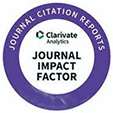Ionic Conductivity of Chitosan-Lithium Electrolyte in Biodegradable Battery Cell
Ali Benouar(1*), Mohammed Reda Ahmed Bacha(2)
(1) Laboratoire de Physico-Chimie des Matériaux, Environnement et Catalyse, Université des Sciences et de la Technologie d’Oran Mohammed Boudiaf, M’Nouar BP, 1505, Oran, Algérie; Ecole Supérieure en Génie Électrique et Énergétique, Oran, Algérie
(2) Ecole Supérieure en Génie Électrique et Énergétique, Oran, Algérie
(*) Corresponding Author
Abstract
The electrical conductivities of salts (LiCl, LiOH) in chitosan as an electrolyte in biodegradable batteries have been measured at the concentration range 10–100 mol m–3 in the temperature range 278–308 K. The data were interpreted in terms of ion–ion and ion–solvent interactions using the Fuoss paired ion. The fitting of Fuoss’ equation of 1978 to these data led us to an estimate of the ionic association by computing the conductimetric pairing constants. In order to optimize the use of the electrolyte in the clean lithium battery, the temperature dependency of conductivity will be studied using Arrhenius empirical equation. This equation was applied successfully in the temperature range used in this study.
Keywords
Full Text:
Full Text PDFReferences
[1] Zong, Z., Kimura, Y., Takahashi, M., and Yamane, H., 2000, Characterization of the chemical and solid state structure of acylated chitosan, Polymer, 41 (3), 899–906.
[2] Ji, K.S., Moon, H.S., Kim, J.W., and Park, J.W., 2003, Role of functional nano-sized inorganic fillers in poly(ethylene) oxide-based polymer electrolytes, J. Power Sources, 117 (1-2), 124–130.
[3] Mohamed, N.S., Subban, R.H.Y., and Arof, A.K., 1995, Polymer batteries fabricated from lithium complexed acetylated chitosan, J. Power Sources, 56 (2), 153–156.
[4] Yahya, M.Z.A., and Arof, A.K., 2003, Effect of oleic acid plasticizer on chitosan–lithium acetate solid polymer electrolytes, Eur. Polym. J., 39, 897–902.
[5] Yahya, M.Z.A., and Arof, A.K., 2004, Conductivity and X-ray photoelectron studies on lithium acetate doped chitosan films, Carbohydr. Polym., 55 (1), 95–100.
[6] Gray, F.M., 1991, Solid Polymer Electrolytes: Fundamentals and Technological Applications, Wiley-VCH, Weinheim, New York.
[7] Khiar, A.S.A., Puteh, R., and Arof, A.K., 2006, Conductivity studies of a chitosan-based polymer electrolyte, Physica B, 373 (1), 23–27.
[8] Fuentes, S., Retuert, P.J., and González, G., 2007, Lithium ion conductivity of molecularly compatibilized chitosan–poly(aminopropyltriethoxy silane)–poly(ethylene oxide) nanocomposites, Electrochim. Acta, 53 (4), 1417–1421.
[9] Singh, A.V., Nath, L.K., and Singh, A., 2010, Pharmaceutical, food and non-food applications of modified starches: A critical review, Electron. J. Environ. Agric. Food. Chem., 9 (7), 1214–1221.
[10] Rosli, N.H.A., Chan, C.H., Subban, R.H.Y., and Winie, T., 2012, Studies on the structural and electrical properties of hexanoyl chitosan/polystyrene-based polymer electrolytes, Physics Procedia, 25, 215–220.
[11] Yulianti, E., Karo, A., Susita, L., and Sudaryanto, 2012, Synthesis of electrolyte polymer based on natural polymer chitosan by ion implantation technique, Procedia Chem., 4, 202–207.
[12] Fuoss, R.M., 1978, Paired ions: Dipolar pairs as subset of diffusion pairs, Proc. Natl. Acad. Sci. U.S.A., 75 (1), 16–20.
[13] Casteel, J.F., and Amis, E.S., 1972, Specific conductance of concentrated solutions of magnesium salts in water-ethanol system, J. Chem. Eng. Data, 17 (1), 55–59.
[14] Vogel, H., 1921, Das temperatur-abhängigkeitsgesetz der viskosität von flüssigkeiten, Phys. Z., 22, 645–646.
[15] Benouar, A., Kameche, M., and Bouhlala, M.A., 2015, Molar conductivities of concentrated lithium chloride–glycerol solutions at low and high temperatures: Application of a quasi-lattice model, Phys. Chem. Liq., 54 (1), 62–73.
[16] Christie, A.M., and Vincent, C.A., 1996, Conductivities of selected lithium salt complexes in propylene carbonate, J. Phys. Chem., 100 (11), 4618–4621.
[17] Bouhlala, M.A., Kameche, M., Tadji, A., and Benouar, A., 2017, Chitosan hydrogel-based electrolyte for clean and biodegradable batteries: Energetic and conductometric studies, Phys. Chem. Liq., 56 (2), 266–278.
Article Metrics
Copyright (c) 2020 Indonesian Journal of Chemistry

This work is licensed under a Creative Commons Attribution-NonCommercial-NoDerivatives 4.0 International License.
Indonesian Journal of Chemistry (ISSN 1411-9420 /e-ISSN 2460-1578) - Chemistry Department, Universitas Gadjah Mada, Indonesia.












